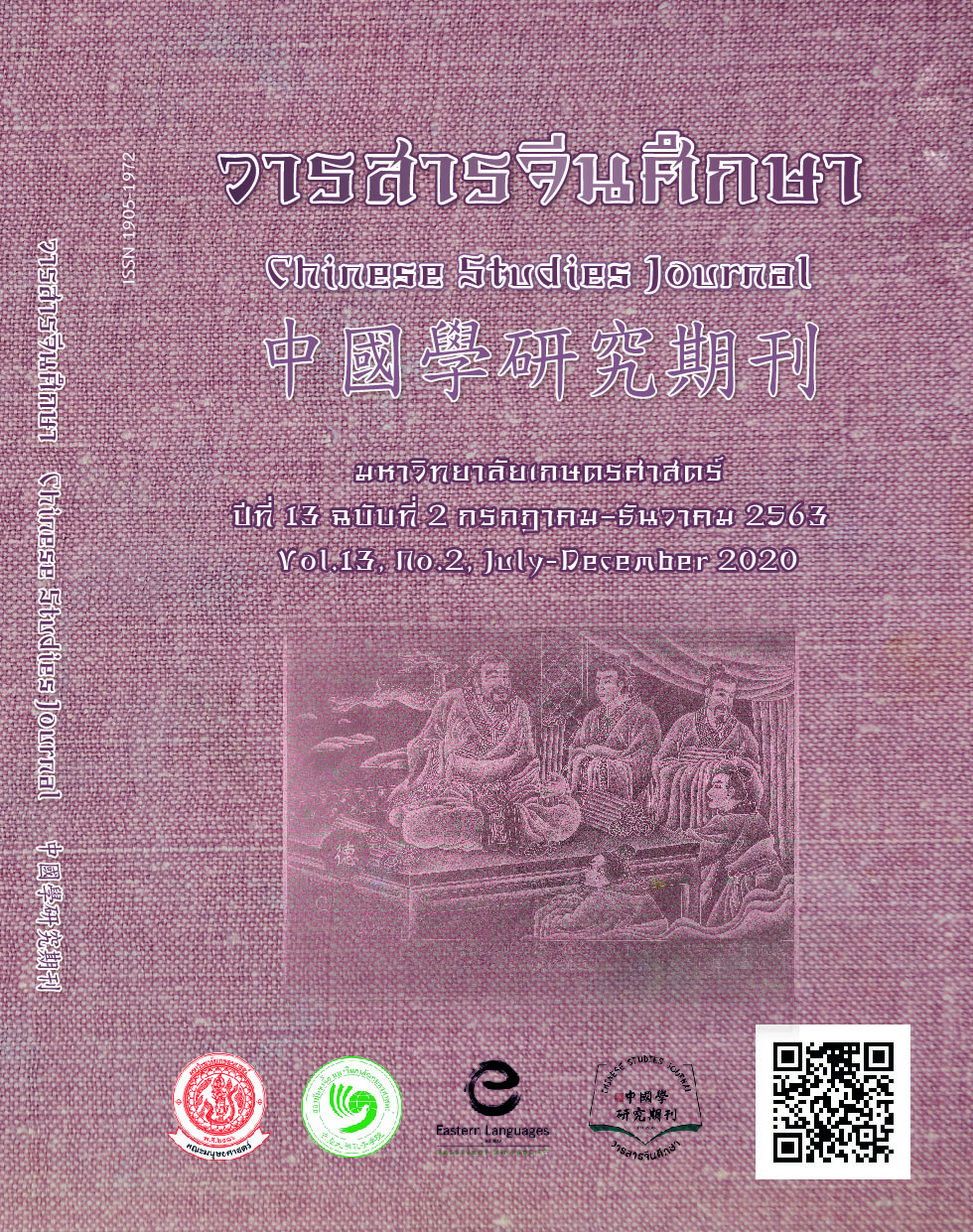Yunnan Province’s Poverty Alleviation Policy “Comprehensive Herbal Garden” : The lesson for Chiang Rai Province
Main Article Content
Abstract
Poverty Alleviation is a policy that China places on high priority. The government focuses on driving and promoting local businesses to be healthy, and self-reliant through the pulling of unique characteristics of each locality business as the key. The comprehensive herbal garden is another master plan that the government of each province is interested in and tries to activate. Each province of China has a different kind of Chinese herbs or Chinese medicine. In this article, we described the basic poverty alleviation methods and put forward a comprehensive herbal garden of Yunnan as a case study in order to demonstrate ways to eliminate poverty directly and apply it to Chiang Rai Province.
Article Details
ผลงานทางวิชาการที่ลงตีพิมพ์ในวารสารจีนศึกษา มหาวิทยาลัยเกษตรศาสตร์ เป็นลิขสิทธิ์ของผู้เขียนหรือผู้แปลผลงานนั้น หากนำลงในวารสารจีนศึกษาเป็นครั้งแรก เจ้าของผลงานสามารถนำไปตีพิมพ์ซ้ำในวารสารหรือหนังสืออื่นได้โดยมิต้องแจ้งให้ทราบล่วงหน้า แต่หากผลงานที่ได้รับพิจารณานำลงในวารสารจีนศึกษา เป็นผลงานที่เคยตีพิมพ์ที่อื่นมาก่อนเจ้าของผลงานต้องจัดการเรื่องปัญหาลิขสิทธิ์กับแหล่งพิมพ์แรกเอง หากเกิดปัญหาทางกฎหมาย ถือว่าไม่อยู่ในความรับผิดชอบของวารสารจีนศึกษา มหาวิทยาลัยเกษตรศาสตร์ ทั้งนี้ ความคิดเห็นต่างๆ ในบทความเป็นความคิดเห็นส่วนตัวของผู้เขียน ไม่เกี่ยวกับกองบรรณาธิการวารสารจีนศึกษา มหาวิทยาลัยเกษตรศาสตร์
References
จาก http://www.thaiembassy.org/kunming/th/ (เข้าถึงวันที่ 29 กุมภาพันธ์ 2020)
สํานักงานเกษตรและสหกรณ์ จังหวัดเชียงราย (2019). แผนพัฒนาการเกษตรและสหกรณ์
ของจังหวัดเชียงราย (2018 - 2022) . สืบค้นจาก
https://www.opsmoac.go.th/chiangrai-strategic-files-421991791793 (เข้าถึง
วันที่ 17 ตุลาคม 2563)
สำนักงานเศรษฐกิจเกษตร จังหวัดเชียงราย (2016). รายงานภาวะเศรษฐกิจการเกษตร
จังหวัดเชียงราย. สืบค้นจาก
http://www3.oae.go.th/zone1/images/WebZone1/04-PDF/2558/03-
economic-condition/2016-ChiangRai.pdf (เข้าถึงวันที่ 17 ตุลาคม 2020)
ศูนย์ข้อมูลเพื่อธุรกิจไทยในจีน (2017). ยูนนานใช้ “หนึ่งอำเภอหนึ่งผลิตภัณฑ์” ส่งเสริม
ของดีในท้องถิ่น ต่อยอดสร้างแบรนด์ “Product of Yunnan” สร้างภาพจำ ย้ำ
คุณภาพสินค้ายูนนาน. สืบค้นจาก https://thaibizchina.com/ (เข้าถึงวันที่ 29
กุมภาพันธ์ 2020)
ศูนย์ข้อมูลเพื่อธุรกิจไทยในจีน (2018). ยูนนานเอาจริง “อาหารสีเขียว” โอกาสไทยเกาะ
กระแสสินค้าอาหารคุณภาพ. สืบค้นจาก https://thaibizchina.com/ (เข้าถึงวันที่
29 กุมภาพันธ์ 2020)
ศูนย์ข้อมูลเพื่อธุรกิจไทยในจีน (2018). มณฑลยูนนานปรับยุทธศาสตร์ใหม่ มุ่งเน้น
“เศรษฐกิจสีเขียว”. สืบค้นจาก https://thaibizchina.com/ (เข้าถึงวันที่ 29
กุมภาพันธ์ 2020)
ศูนย์ข้อมูลเพื่อธุรกิจไทยในจีน (2020). ปี 2562 ยูนนานลดคนจน 1.368 ล้านคน เหลืออีก
กว่า 4 แสนคน สูงสุดในจีน. สืบค้นจาก https://thaibizchina.com/ (เข้าถึงวันที่ 29
กุมภาพันธ์ 2020)
董晓波、王海燕等(2018).云南省精准扶贫综合评价研究.西南农业学报, 31(6),1322-1328.
国家统计局住户调查办公室 (2015).《中国农村贫困检测报告(2015)》,中国统计出版社.
李汉泽、李小云(2018).精准扶贫:理论基础、实践困境与路径选择——基于云南两大贫困县的调研.探索与争鸣, 106-111.
刘洪强、常峰、杨莎莎(2016).中药材产业化扶贫开发对策研究——以陕西省安康市镇坪县为例.陕西农业科学, 62(01),102-105,109.
宋媛(2018).云南省扶贫开发报告.新西部, 114-130.
王建任(2017).中药产业是精准扶贫的好帮手.中国农村卫生, 20-21.
云南日报(2020). 全省脱贫攻坚取得决定性胜利,云南. 云南日报报业集团.
云南省人民政府(2017).《云南脱贫攻坚规划(2016-2020年)》.
云南省人民政府扶贫开发领导小组办公室编(2007).《云南省扶贫开发志(1987-2005) 》,云南民族出版社.
人民日报(2012).在《意见》出台一周年之际,本报记者就一年来,云南桥头堡战的工作,http://paper.people.com.cn/rmrbhwb/html/2012-05/11/content_1049481.htm?div=-1.
中国社会科学院扶贫开发报告课题组(2016).《中国扶贫开发报告(2016)》,社会科学文献出版社.


